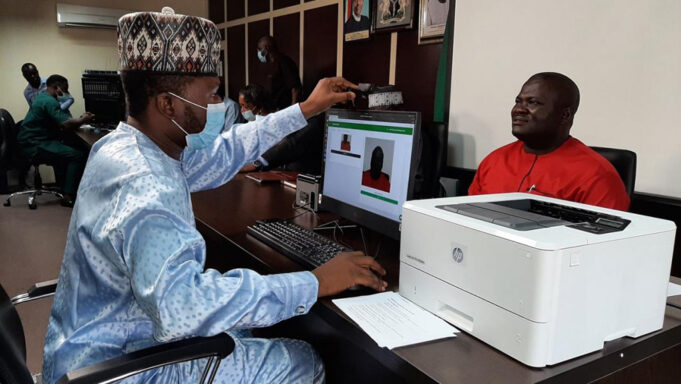The Independent National Electoral Commission (INEC) has said seven million Nigerians failed to complete physical requirements for the Continuous Voter Registration (CVR).
INEC disclosed that out of 10,487,972 Nigerians who carried out their pre-registration online, only 3,444,378 completed the process at a physical centre.
The INEC National Electoral Commissioner for Information and Voter Education, Festus Okoye, who made the disclosure on Tuesday, said most of those who could not complete the registration are Nigerians living abroad.
Okoye noted that the commission was blameless as the majority of the affected registrants could not have been able to appear in person as they are based outside Nigeria.
According to him, the electoral body is ready to avail data relating to online registration to various groups or individuals accusing the commission of disenfranchising the said seven million registrants from voting in the 2023 general election.
The Socio-Economic Rights and Accountability Project (SERAP) has written to INEC on the need to allow the seven million registrants to complete the CVR or face legal action.
“Denying a significant number of eligible voters the time and opportunity to complete the registration for their PVCs would impair the right to vote of those affected, deny them a voice in the 2023 elections, and lead to disparate and unfair treatment of these voters.
“The failure of the applicants to complete their registration may be due to factors entirely outside of their control, especially given the well-documented challenges faced by many Nigerians at registration centres across the country.
READ ALSO: INEC denies listing Lawan, Akpabio as senatorial candidates
“We would be grateful if the recommended measures are taken within seven days of the receipt and/or publication of this letter. If we have not heard from you by then, SERAP and the affected Nigerians shall consider appropriate legal actions to compel INEC to comply with our request in public interest,” SERAP wrote.
However, Okoye explained that some of the seven million registrants that SERAP alluded to are in diaspora, and could not meet the legal requirements and threshold of physical biometric capture as mandatorily provided in Section 10(2) of the Electoral Act, 2022.
“SERAP should approach the commission and properly and comprehensively understand the processes and procedures of the commission.
“Their conclusive assertion of the existence of seven million disenfranchised registrants is a product of poor understanding of the processes and procedures of the commission.
“The commission is ready and willing to avail them of the data relating to online registration if they avail themselves of the option of engagement.
“The seven million individuals they alluded to are some of those that are in diaspora and could not meet the legal requirements and threshold of physical biometric capture as mandatorily provided in Section 10(2) of the Electoral Act 2022.
“Some of the seven million started the online pre registration and abandoned same and proceeded to carry out physical registration,” he said.
Okoye added that the commission is currently working on the register in preparation to the display for claims and objections.
- Tinubu: APC correcting PDP’s mess in 16 years’ regime - September 5, 2022
- Oil marketers embark on strike in northern states over N70bn claims - September 5, 2022
- FG files fresh charges against Abba Kyari, Ubua, seizes properties - September 5, 2022










